Save your garden potatoes in a smaller space! Here’s how you can make your own dehydrated potato flakes from scratch!
Buying boxed potato flakes for quick and easy mashed potatoes may seem like a great idea most of the time, right? There are some weird ingredients in the most popular brands that I want to avoid, and I like giving my family wholesome foods. Of course, you can easily store potatoes in a root cellar to last all winter long. So why would I bother making homemade potato flakes?
There are several reasons. First, just because I can! I grow potatoes in my garden, and this is an alternative way to preserve the harvest.
I often pressure can my potatoes for long-term storage, since I don’t have a root cellar, but I want another way to store them without taking up so much room. Have you tried putting a 50-pound sack of potatoes in a bug out bag?
That same amount can fit into a 1/2 gallon-sized mason jar, or a gallon-sized Ziploc bag with room to push out the air and save space and weight. If I had to bug out, I certainly wouldn’t want to lug a huge sack of ‘taters with me.
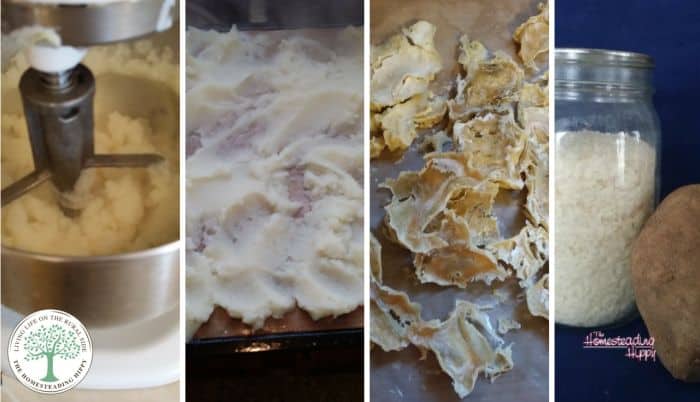
Dehydrating your own potato flakes isn’t hard at all.
It just requires a bit of time and effort upfront to get going. You start by washing and peeling your potatoes. You could leave the skins on, but the end result may be on the bitter side.
Once you have the potatoes peeled, bring them to a boil in a large pot with enough water to cover them. Cook until the potatoes are done, with a fork or knife going thru them easily. You want them a bit on the mushier side.
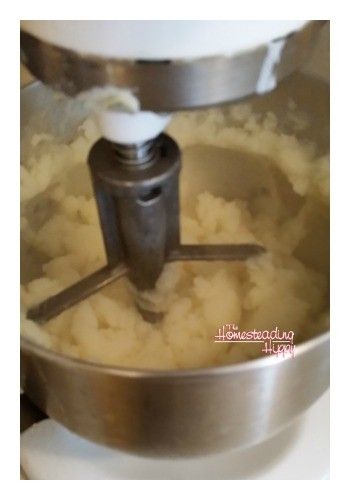
Once the potatoes finish cooking, DO NOT DRAIN.
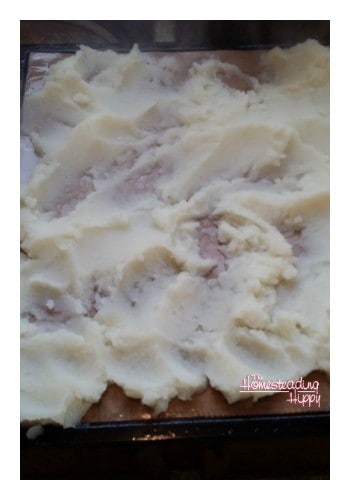
You want to use the cooking water to mash them. This stage isn’t the time to season or use milk or butter. That will come when you cook and rehydrate the flakes.
Put the cooked potatoes in a mixing bowl and whip with only the cooking water until smooth. I used my kitchen aid for this, but you could do it with a hand mixer or even masher if you wanted. You want it as smooth as possible.
Lay the mashed potatoes out on a dehydrator sheet.
When you visit a link in this article that takes you to a different website where you can purchase something, I may earn a commission. Read my full disclosure for more details.
I used the Excalibur dehydrator for this. You will want to dehydrate the potatoes at 140° for about 24-36 hours, depending on how thick you put the potatoes on. I made them thicker than I should have the first time, and some turned black on me. They tasted the same, but it was a weird color and a bit off-putting for my family.
The thinner you layer the potatoes on the sheet, the faster they dry, and the less likely they are to turn black. After 12-15 hours, check the potatoes for dried pieces and turn them over. Turning will help get more air circulating to them and they will dry faster.
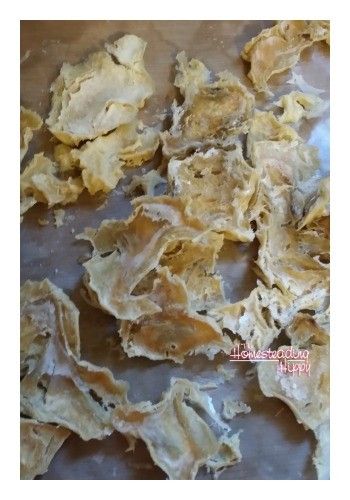
You’ll know they are finished when they “break” instead of “bend” and they are a whitish golden color. Remove the dried pieces from the dehydrator and place them in either a blender or food processor to break up into flakes.
Store in an airtight container. I use my dehydrated potatoes up each year, but if there is no water in them, the shelf life could be at least a couple of years stored airtight.
To use your dehydrated potato flakes
- Bring 2/3 cup water and 1 Tablespoon butter to a boil.
- Turn off the heat and add 1/4 cup milk and stir in 2/3 cup flakes.
- Add more butter or milk to taste, as this recipe will make potatoes that are on the “stiffer” side.
Want to get more ideas? Try these related posts:
- Dehydrating Eggs for Long-Term Storage
- Make Your Own Beef Boullion
- No Cook Fruit Leather
- Instant Low-Carb Faux Tato Flakes
Be sure to add this post to your favorite Pinterest board for later…
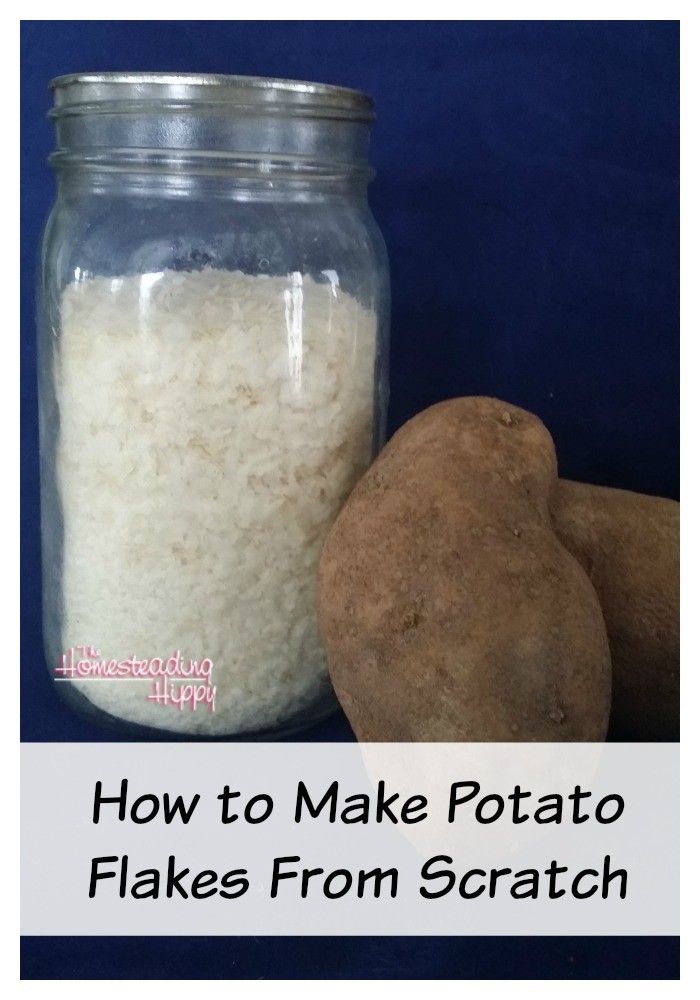
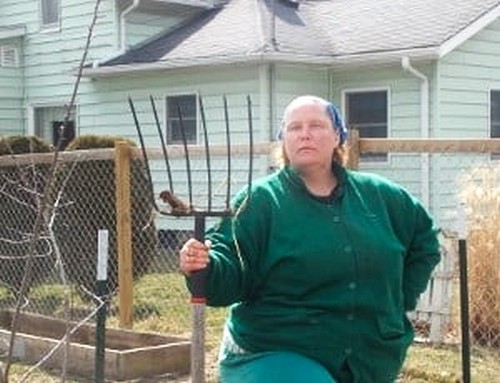
Heather’s homesteading journey started in 2006, with baby steps: first, she got a few raised beds, some chickens, and rabbits. Over the years, she amassed a wealth of homesteading knowledge, knowledge that you can find in the articles of this blog.
Learn more about Heather and the rest of the writers on this page.

Oh this is great to have on hand – thank you!
you are welcome!
Hi Heather
I made this yesterday and today I am trying to flake it.
I only have a blender and my potatoes either come out powdery or coarse chunks.
Any suggestions
I cannot wait to try this method. I am anxious to learn more prepping ideas. Thanks for sharing!
A great alternative to using up a lot of lids & jars in today’s inflated pricing & supply forecasting! Thx!
I have seen oven canning for items like popcorn and rice. Have you tried this method with your potatoes? I’m curious to see what the shelf life would be.
I haven’t ever oven canned…I usually just use the food saver vacuum sealer. But, I will try it and see if I can update the post with that info!
Oven canning doesn’t do anything but seal the jars… just use a food saver with the lid attachment on it
very true! but, for those who do not have a food saver, oven canning CAN help 🙂
Hi Heather .. do I use all the cooking water when mashing? I am boiling about 20 potato’s so there’s a fair bit of water
Thank you
Margie from Aus
http://www.pump-n-seal.com/ (uses ordinary zipper-locking bags (not special FoodSaver bags) and ordinary glass jars as food storage containers. The Pump N Seal food saver vacuum sealer works by permanently vacuum packing food in a commercial strength vacuum, using the same jar and lid hundreds of times)
How many cups of water and how many potatoes to use ? Without draining water. Thank you.
Use as many potatoes as you want, and have enough water to cover them while cooking. You just want to have the cooking water to mash them up with.
How many servings does your rehydrated recipe make with the potatoes?
Wonder if I could do this with cauliflower for a low carb “fauxtatoe” experience? Thoughts?
oh, that’s an interesting idea! I may have to grab some cauliflower today!
My hubby calls them caulitaters lol
You can but no need to boil and smash! Just slice and dehydrate then blender to powdered when crunchy dry!
I am assuming that is for one serving??
yes, that is one serving size.
I have been given a LOAD of potatoes so this is perfect timing. Can you mix the kinds of potatoes? Like red, yellow and russet together?
I honestly don’t see why you couldn’t do that. I bet that would give it a lot more flavor in the end as well!
This would be great in the fall when we can get potatoes very cheap. It has gotten lately where I haven’t wanted to buy so much because they spoil. I could do this and have them for quite a while! Love this thanks for the how to.
This is so fantastic! I’m sharing this and can’t wait to try it out!
Awesome! Please let me know how it works out for you!
Would this also work in an oven at a bit higher heat (170)? I know sometimes these recipes can be tweaked, and as I don’t have a dehydrator, wonder if I could still take advantage of this method.
It’s very possible, and I’d say worth a shot!
Also if u have a convection oven it may work faster because it works with a fan moving air.
I’m new to your site, but I have to say this is the neatest idea I have ever seen! Thanks
Hi Margem! Thanks for coming by! I am glad you enjoyed this idea…let me know how it works for you!
If you don’t want to sit there peeling potatoes… after boiling them, place them in a bowl of ice water for a few seconds. Then, just grab it with both hands, twist, and pull apart. The skin should slide right off. (some people suggest scoring the middle before boiling) I just found this trick a few days ago and now seeing your idea I think it is time to test it out!!! What a great idea. I never would have thought flakes would be so easy to do! Thanks for this post!
that’s a great idea! I’m going to try that trick!
Great trick! I’m definitely one who doesn’t enjoy peeling!
I don’t have any mesh to put on my trays and they are not readily available.
What can I use instead, anyone ????
Parchment paper will work
Cut to size lace curtains also work a treat.
Parchment paper … it’s all I’ve ever used for wet ingredients like this.
I had a 5 lb bag of potatoes that I had let sit to long, so I decided to try this. Peeled the potatoes and cooked them whole. Once done I mixed 1/2 T citric acid with a little cold water then added it as I mashed them ( to help keep the color). Had 4 dehydrator trays and one cookie sheet for the oven. In the oven I dried them at 170 degrees for about 5 hours with the door propped open., I flipped them about 1/2 way through. Then ran them through the blender, and put them back on the tray for about 1/2 hour, just to be sure they were dry. They turned out great rehydrated well. For 5 lbs of potatoes, I got 11 oz dry. Which works out to 2.2 oz dry = 1lb. So 1/4 cup of flakes will rehydrate to about 1 lb of mashed potatoes. If you are making up packages for camping you can add powdered butter and powdered milk, just increase your water to cover the fact you aren’t adding reg. milk.
I love that you added conversions and everything. Does running an open oven at 170 use a lot of energy. Part of the reason I don’t use my dehydrator more is that I don’t want my electric bill to go through the roof and it this so long…
Oh my your electric bill will be way more than using the dehydrator. They use very little energy.
Do you think that you could do this effectively with pumpkin or squash? I don’t enjoy pressure canning pumpkin puree, and would love to have home grown ingredients for pumpkin pies/breads all year long.
I have never tried that…worth a shot, though! You may want to consider freezing the puree, too.
From all I read, pumkin and squash should always be canned in chunks or cubes. Due the heat not permeateting through, make it unsafe to can puried foods. I could be wrong.
that’s what my understanding is, too.
I really want these, tried it last year. Coincidentally following this exact procedure. When rehydrating they were like paste! I’m assuming it’s a starch issue, do you know what I might have done wrong? Ever had that problem?
I had to use more water with some rehydrated batches…not really sure why, to be honest. Perhaps the starch stayed in longer when drying?
In my opinion, the potatoes were over mixed through using either a hand mixer or a kitchenaid. Overworking potatoes results in overdeveloped starches and a gluey consistency, this is true even if you dehydrate it and then reconstitute it. The best thing to do is mash the drained potatoes normally using a masher until they are fluffy but not overworked, then dehydrate. There is no need to include so much water, since it’s just added work for your dehydrator. After the potatoes are dry, it’s easy to bust them up with a food processor anyway, which eliminates any lumps which may have been left by processing.
^^^^^ what Dana said 🙂
They type of potato can cause this also. Each potato type has a different consistency when using them, which is why some are good baked, some mashed, some fried, etc.
I tried this with sweet potatoes. They came out excellent.
that’s great to know!!! I’ll have to try it with sweet potatoes next!
Interesting idea!! I would not have thought to cook the potatoes before dehydrating them. Hmmmm. Have you tried drying raw potato slices? Maybe using a mandoline slicer on a really fine setting? I’m just curious. Would love to hear if anyone has tried this.
I tried that, but since they were not blanced, they turned an ugly black color. it didn’t affect the taste, but my family wouldnt eat them.
Oh my YES!! I use my mandoline to slice the potatoes ( I leave the skins on) and then blanch till you can “see” through them but dont make them into mush. Rinse in COLD water and place on dehydrator as per instructions. They turn out GREAT!!!!
It’s awesome, isn’t it? Great way to store and use them all year long!
I think I am going to try this method
Have u ever try baking your potatoes first then add enough hot water so it will mash up to look like mash potatoes?
I have never tried baking them…that’s an interesting thought. Maybe I’ll try that to see what’s up with it!
Hi, I tried making these and they would not rehydrate properly. I was so disapointed cause I thought this would be such a great idea. There were parts of the potatoes that just never softened up. I could try cooking them longer but then they wouldn’t be “instant” potatoes. Anyone else have that problem?
I honestly can’ say for sure why…ours have never had an issue. Maybe not enough liquid?
Some potatoes have “stone hearts” – centers which, no matter how long you cook them, will never soften. Perhaps you had a bag of those (seems that if one potato in the bag has that problem, every potato in the bag has that problem.)
Thank you, Darlene! I just had a bag of these kind of potatoes from Sam’s Club and didn’t understand this concept. I’ve NEVER gotten bad produce from there, but no matter how long I baked or boiled those potatoes, they never softened. Finally made hash browns out of them all (to freeze) and they’re ok.
I have ran into this twice with scalloped potatoes, they just wouldn’t cook
This is the hard way I just peal and slice and put in lemon juice while I am working pat dry put in hyderator
when done I use them for scalloped potatoes or run them through the processer for mashed Also do pumpkin to rehydrate back into pumpkin pie
thanks for sharing that tip!
I’ve dehydrated potatoes in a few forms and one of my favorites is to use a potato ricer. I get the trays ready and I don’t even have to peel the potatoes. it works with them boiled or even big baked potatoes. Once the potatoes are cooked through I just cut in half or quarters if large baking russets) and get the tray out and squeeze those hot potatoes right onto the dehydrating trays. The skins stay in the ricer so you just remove them between squishes. Do not mash them down but try to get them even while squishing them through the ricer onto the trays. I dry at highest setting for at least 20 or so hours. less sometimes, like for the baked potatoes and more for the boiled. I do check them and flip the thicker areas and break them up a bit. After they are fully crispy and dry I sometimes break them up more in the food processor but most times they fall apart in little tiny beads/rice shapes and they do well for mashed potatoes or I add a few scoops to any creamy soup to add more oomph to it and make it nice and thick so not using a lot of extra cream or even cornstarch to thicken 🙂
I have found that with rehydrating it is a bit of trial and error as each batch of taters seems to want it’s own amount of liquids. The dried potatoes remind me almost of potato buds. for more instant I’d bet whizzing them in the food processor till almost powdered would work great too. Hope this helps others 🙂
P/S love your blog.
This will be perfect for the gluten ‘steaks’ and mashed potatoes meal I’m planning for our next camping trip!
I tried dehydrating mash potatoes for the first time, I don’t know if I did something or but the taste was kind of off when I rehydrated some. Any ideas? I would like to do a lot more at harvest time, but don’t want the same results. Thank you.
What is the criteria for choosing the right temperature for the different items to be dehydrated? Sometimes I see 125, 135, 145……
Is it a different range for different items?
I am just wondering if they taste like real mashed potatoes or do they taste like those nasty instant mashed potatoes, because I am a lover of mashed potatoes, but I can’t get past the strange taste of the store box instant mashed potatoes. And I love this idea. Thank you!
Those “nasty instant mashed potatoes” are the same thing. They are REAL, dehydrated potatoes. But, of course, your own will taste better.
Instant turns out much better if you follow the directions on the box exactly. Using evaporated milk improves the taste, too. I try to make homemade but keep some instant on hand for emergencies and to thicken soups.
Thank you for posting this. I tried your method and successfully dried 9 trays in our Excalibur. I wanted to share my method of spreading them thin on the sheets as I did not add extra water when mashing. I simply put a “blob” of mashed potatoes on the center of the sheet, covered it with another sheet and used a rolling pin to get them around 1/8 to 1/4” thick. This was fast and effective.
Just pulled a 5 gallon corny keg out of storage, full of instant mashed potatoes that I stored in 2009. Mixed up one cup and ate, seem to be totally fine and edible.
There is no salt in the recipe to make them. For me salt is necessary for any potato. I’d start out on the low end until i figured how much salt my taste buds require. Good luck. ?
Hi, I’m worried about the potatoes turning out starchy and mushy as some people have experienced. Could I slice the potatoes really thinly, then blanch or cook them, then without mashing them lay them on parchment paper in the dehydrator, and then after the sliced potatoes are dehydrated put them in the food processor to make them into flakes/powder?
I was wondering if a guy added a little lemon juice when you are mashing them. This would keep your tators from turning dark and shouldn’t effect the taste.
You can roast your pumpkin to soft, puree it, spread thin on dehydrator tray with parchment paper or fruit roll tray. When dry powder it in blender,add water when you want to use to make pie, etc. Works well.
I am dehydrating mashed potatoes today! I am wondering if these home made dehydrated mashed taters will taste again like the home made fresh taters when they are rehydrated. I am not a fan of store bought instant mashed potatoes and this was a lot of work so I am hoping the reward is tasty when I go to use them. Any feedback from those who have used your dehydrated mashed potatoes.